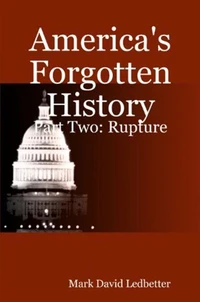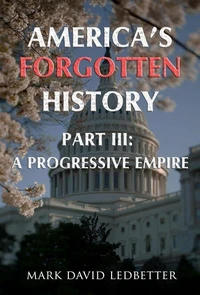America's Forgotten History, Part Four: Grotius Rises. America’s Forgotten History, #4
Par :Formats :
Disponible dans votre compte client Decitre ou Furet du Nord dès validation de votre commande. Le format ePub est :
- Compatible avec une lecture sur My Vivlio (smartphone, tablette, ordinateur)
- Compatible avec une lecture sur liseuses Vivlio
- Pour les liseuses autres que Vivlio, vous devez utiliser le logiciel Adobe Digital Edition. Non compatible avec la lecture sur les liseuses Kindle, Remarkable et Sony
 , qui est-ce ?
, qui est-ce ?Notre partenaire de plateforme de lecture numérique où vous retrouverez l'ensemble de vos ebooks gratuitement
Pour en savoir plus sur nos ebooks, consultez notre aide en ligne ici
- FormatePub
- ISBN978-1-386-14708-4
- EAN9781386147084
- Date de parution24/01/2019
- Protection num.pas de protection
- Infos supplémentairesepub
- ÉditeurRelay Publishing
Résumé
The chapters of America's story are marked by momentous events. In 1776, in some English colonies of America, proud inheritors of the Glorious Revolution of 1688 declared both their independence and intention to form a government based on Enlightenment principles. Despite inevitable missteps and contradictions, some major, those living the story mostly stayed true to the Classical Liberal project of minimalist government and individual rights until the end of the nineteenth century.
After the Spanish-American War, though, with the acquisition of an explicit Pacific empire and the enthusiastic embrace of Progressivism, America embarked on a new experiment for the new century, one which valued activist government and equality. If the first experiment lasted one hundred and twenty years, the second experiment, too, is now a hundred and twenty years old, and tottering on the edge of a widening gyre as, perchance, we enter a third era.
If the gods are smiling on us, we will pull back from the edge to combine in the Third Era the best of the First and Second. If they are not, the forces of history might yet plunge our civilization into the inferno, as they have done to so many other great civilizations. Grotius Rises is a history of the foundational first three decades of the Second Era of the American story. It takes us from the presidential administration of Theodore Roosevelt to that of Herbert Hoover; from the Spanish-American War to the Great Depression, three decades that saw Classical Liberalism fall as Progressivism rose to take its place.
After the Spanish-American War, though, with the acquisition of an explicit Pacific empire and the enthusiastic embrace of Progressivism, America embarked on a new experiment for the new century, one which valued activist government and equality. If the first experiment lasted one hundred and twenty years, the second experiment, too, is now a hundred and twenty years old, and tottering on the edge of a widening gyre as, perchance, we enter a third era.
If the gods are smiling on us, we will pull back from the edge to combine in the Third Era the best of the First and Second. If they are not, the forces of history might yet plunge our civilization into the inferno, as they have done to so many other great civilizations. Grotius Rises is a history of the foundational first three decades of the Second Era of the American story. It takes us from the presidential administration of Theodore Roosevelt to that of Herbert Hoover; from the Spanish-American War to the Great Depression, three decades that saw Classical Liberalism fall as Progressivism rose to take its place.
The chapters of America's story are marked by momentous events. In 1776, in some English colonies of America, proud inheritors of the Glorious Revolution of 1688 declared both their independence and intention to form a government based on Enlightenment principles. Despite inevitable missteps and contradictions, some major, those living the story mostly stayed true to the Classical Liberal project of minimalist government and individual rights until the end of the nineteenth century.
After the Spanish-American War, though, with the acquisition of an explicit Pacific empire and the enthusiastic embrace of Progressivism, America embarked on a new experiment for the new century, one which valued activist government and equality. If the first experiment lasted one hundred and twenty years, the second experiment, too, is now a hundred and twenty years old, and tottering on the edge of a widening gyre as, perchance, we enter a third era.
If the gods are smiling on us, we will pull back from the edge to combine in the Third Era the best of the First and Second. If they are not, the forces of history might yet plunge our civilization into the inferno, as they have done to so many other great civilizations. Grotius Rises is a history of the foundational first three decades of the Second Era of the American story. It takes us from the presidential administration of Theodore Roosevelt to that of Herbert Hoover; from the Spanish-American War to the Great Depression, three decades that saw Classical Liberalism fall as Progressivism rose to take its place.
After the Spanish-American War, though, with the acquisition of an explicit Pacific empire and the enthusiastic embrace of Progressivism, America embarked on a new experiment for the new century, one which valued activist government and equality. If the first experiment lasted one hundred and twenty years, the second experiment, too, is now a hundred and twenty years old, and tottering on the edge of a widening gyre as, perchance, we enter a third era.
If the gods are smiling on us, we will pull back from the edge to combine in the Third Era the best of the First and Second. If they are not, the forces of history might yet plunge our civilization into the inferno, as they have done to so many other great civilizations. Grotius Rises is a history of the foundational first three decades of the Second Era of the American story. It takes us from the presidential administration of Theodore Roosevelt to that of Herbert Hoover; from the Spanish-American War to the Great Depression, three decades that saw Classical Liberalism fall as Progressivism rose to take its place.






